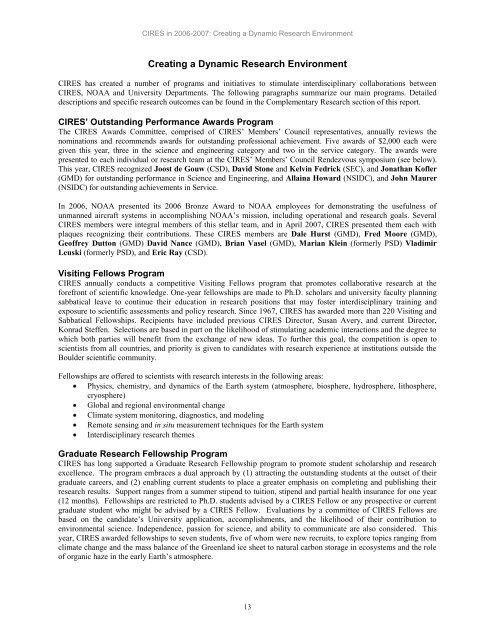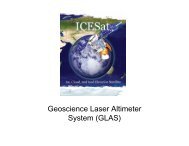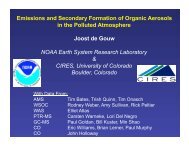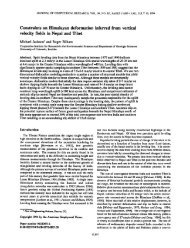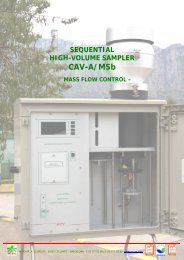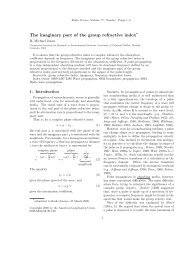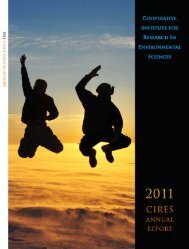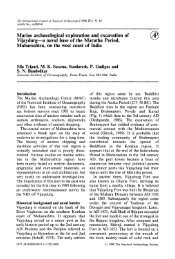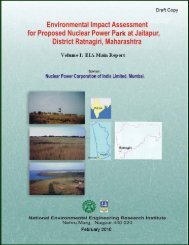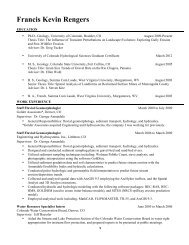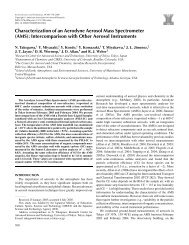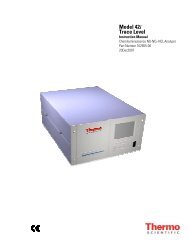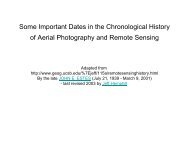Scientific Theme: Advanced Modeling and Observing Systems
Scientific Theme: Advanced Modeling and Observing Systems
Scientific Theme: Advanced Modeling and Observing Systems
Create successful ePaper yourself
Turn your PDF publications into a flip-book with our unique Google optimized e-Paper software.
CIRES in 2006-2007: Creating a Dynamic Research Environment<br />
Creating a Dynamic Research Environment<br />
CIRES has created a number of programs <strong>and</strong> initiatives to stimulate interdisciplinary collaborations between<br />
CIRES, NOAA <strong>and</strong> University Departments. The following paragraphs summarize our main programs. Detailed<br />
descriptions <strong>and</strong> specific research outcomes can be found in the Complementary Research section of this report.<br />
CIRES’ Outst<strong>and</strong>ing Performance Awards Program<br />
The CIRES Awards Committee, comprised of CIRES‘ Members‘ Council representatives, annually reviews the<br />
nominations <strong>and</strong> recommends awards for outst<strong>and</strong>ing professional achievement. Five awards of $2,000 each were<br />
given this year, three in the science <strong>and</strong> engineering category <strong>and</strong> two in the service category. The awards were<br />
presented to each individual or research team at the CIRES‘ Members‘ Council Rendezvous symposium (see below).<br />
This year, CIRES recognized Joost de Gouw (CSD), David Stone <strong>and</strong> Kelvin Fedrick (SEC), <strong>and</strong> Jonathan Kofler<br />
(GMD) for outst<strong>and</strong>ing performance in Science <strong>and</strong> Engineering, <strong>and</strong> Allaina Howard (NSIDC), <strong>and</strong> John Maurer<br />
(NSIDC) for outst<strong>and</strong>ing achievements in Service.<br />
In 2006, NOAA presented its 2006 Bronze Award to NOAA employees for demonstrating the usefulness of<br />
unmanned aircraft systems in accomplishing NOAA‘s mission, including operational <strong>and</strong> research goals. Several<br />
CIRES members were integral members of this stellar team, <strong>and</strong> in April 2007, CIRES presented them each with<br />
plaques recognizing their contributions. These CIRES members are Dale Hurst (GMD), Fred Moore (GMD),<br />
Geoffrey Dutton (GMD) David Nance (GMD), Brian Vasel (GMD), Marian Klein (formerly PSD) Vladimir<br />
Leuski (formerly PSD), <strong>and</strong> Eric Ray (CSD).<br />
Visiting Fellows Program<br />
CIRES annually conducts a competitive Visiting Fellows program that promotes collaborative research at the<br />
forefront of scientific knowledge. One-year fellowships are made to Ph.D. scholars <strong>and</strong> university faculty planning<br />
sabbatical leave to continue their education in research positions that may foster interdisciplinary training <strong>and</strong><br />
exposure to scientific assessments <strong>and</strong> policy research. Since 1967, CIRES has awarded more than 220 Visiting <strong>and</strong><br />
Sabbatical Fellowships. Recipients have included previous CIRES Director, Susan Avery, <strong>and</strong> current Director,<br />
Konrad Steffen. Selections are based in part on the likelihood of stimulating academic interactions <strong>and</strong> the degree to<br />
which both parties will benefit from the exchange of new ideas. To further this goal, the competition is open to<br />
scientists from all countries, <strong>and</strong> priority is given to c<strong>and</strong>idates with research experience at institutions outside the<br />
Boulder scientific community.<br />
Fellowships are offered to scientists with research interests in the following areas:<br />
Physics, chemistry, <strong>and</strong> dynamics of the Earth system (atmosphere, biosphere, hydrosphere, lithosphere,<br />
cryosphere)<br />
Global <strong>and</strong> regional environmental change<br />
Climate system monitoring, diagnostics, <strong>and</strong> modeling<br />
Remote sensing <strong>and</strong> in situ measurement techniques for the Earth system<br />
Interdisciplinary research themes<br />
Graduate Research Fellowship Program<br />
CIRES has long supported a Graduate Research Fellowship program to promote student scholarship <strong>and</strong> research<br />
excellence. The program embraces a dual approach by (1) attracting the outst<strong>and</strong>ing students at the outset of their<br />
graduate careers, <strong>and</strong> (2) enabling current students to place a greater emphasis on completing <strong>and</strong> publishing their<br />
research results. Support ranges from a summer stipend to tuition, stipend <strong>and</strong> partial health insurance for one year<br />
(12 months). Fellowships are restricted to Ph.D. students advised by a CIRES Fellow or any prospective or current<br />
graduate student who might be advised by a CIRES Fellow. Evaluations by a committee of CIRES Fellows are<br />
based on the c<strong>and</strong>idate‘s University application, accomplishments, <strong>and</strong> the likelihood of their contribution to<br />
environmental science. Independence, passion for science, <strong>and</strong> ability to communicate are also considered. This<br />
year, CIRES awarded fellowships to seven students, five of whom were new recruits, to explore topics ranging from<br />
climate change <strong>and</strong> the mass balance of the Greenl<strong>and</strong> ice sheet to natural carbon storage in ecosystems <strong>and</strong> the role<br />
of organic haze in the early Earth‘s atmosphere.<br />
13


